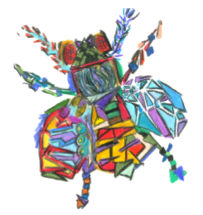We welcome applications to join our group, especially from young scientists who bring novel expertise or points of view that can be applied to our overall aims.
Our lab (consisting of 10-15 scientists) is located at the Francis Crick Institute in the Kings Cross area of North London.

Our home – The Francis Crick Institute
We are generally interested in the signalling activities that control patterning, growth and apoptosis in epithelia. Here are some of the questions we investigate:
- How do morphogens control cell fate decisions and tissue growth?
- What is the cellular and molecular basis of morphogen gradient formation?
- How are pro-growth signals integrated to ensure ‘just-right’ tissue size?
- How is cellular stress managed to balance apoptosis and compensatory proliferation in a model ribosomopathies?
Although much of our work is focused on signalling by Wnt proteins, we consider the role of several other signalling pathways, including those mediated by Decapentaplegic (a BMP), JNK, and the Ecdysone receptor.
Our animal model of choice is the fruit fly Drosophila. We also make use of cells in culture when appropriate. Although our research is not applied, we hope that it will help identify and characterise molecules and processes that are relevant to human diseases. For example, we are developing tools to detect Notum, a secreted protein highly expressed by colon cancer cells. Our general approach involves merging the power of genome engineering with a variety of techniques borrowed from cell biology, biochemistry, chemistry, and physics. Our multidisciplinary approaches are made possible by our wonderful collaborators and the Crick’s science technology platforms.
For more information on our work, please visit our research and publications pages.
The Vincent lab is mostly funded by the Francis Crick Institute and the Wellcome Trust. We have recently been awarded a collaborative award from the Wellcome Trust to study the transport of Wnts and a project grant from the MRC to study the cellular basis of ribosomopathies. We also receive funding (in the form of post-doctoral fellowships) from the European Molecular Biology Organisation (EMBO) and the European Union.

KEYWORDS: wingless, wnt, apoptosis, Crick, J.P. Vincent Lab, morphogen, Drosophila, patterning, signalling, epithelia, development, ribosome deficiency